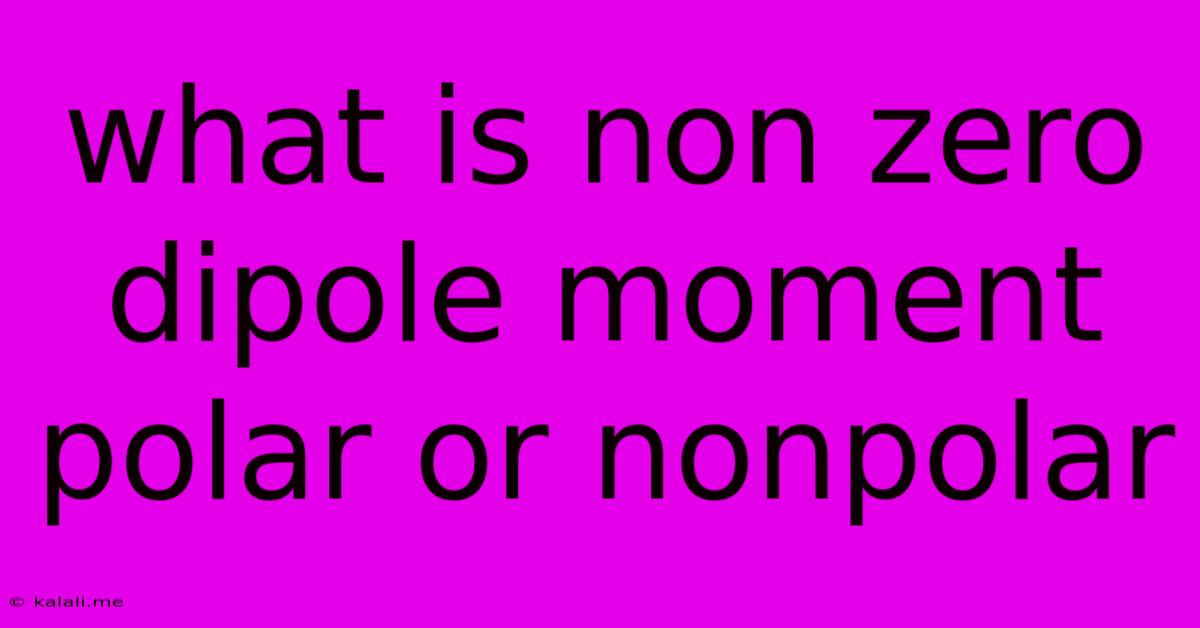What Is Non Zero Dipole Moment Polar Or Nonpolar
Kalali
Jun 12, 2025 · 3 min read

Table of Contents
What is a Non-Zero Dipole Moment? Polar vs. Nonpolar Molecules
Understanding dipole moments is crucial for predicting the behavior of molecules, especially their interactions with electric fields and other molecules. This article will clarify what a non-zero dipole moment signifies and how it distinguishes polar from nonpolar molecules. We'll explore the concepts of electronegativity, molecular geometry, and their combined influence on a molecule's overall polarity.
A dipole moment is a measure of the separation of positive and negative charges within a molecule. It's a vector quantity, meaning it has both magnitude (size) and direction. A non-zero dipole moment indicates an uneven distribution of charge within the molecule; one end carries a partial positive charge (δ+), and the other end carries a partial negative charge (δ−). This asymmetry arises due to differences in electronegativity among the constituent atoms and the molecule's overall geometry.
Electronegativity: The Driving Force Behind Polarity
Electronegativity is an atom's ability to attract electrons in a chemical bond. When two atoms with different electronegativities bond, the more electronegative atom pulls the shared electrons closer to itself, creating a polar bond. The greater the difference in electronegativity, the more polar the bond becomes. For example, the bond between oxygen (highly electronegative) and hydrogen (less electronegative) in a water molecule (H₂O) is a polar bond.
Molecular Geometry: The Shape Matters
Even if a molecule contains polar bonds, the overall molecule might not have a non-zero dipole moment. This depends heavily on the molecule's geometry. The individual bond dipoles act as vectors; if these vectors cancel each other out due to symmetry, the molecule's net dipole moment will be zero.
Polar Molecules: Non-Zero Dipole Moment
A polar molecule possesses a non-zero dipole moment. This happens when:
- Polar bonds are present: The molecule contains bonds between atoms with significantly different electronegativities.
- Asymmetrical geometry: The polar bonds are arranged asymmetrically, meaning the bond dipoles do not cancel each other. Examples include water (H₂O), ammonia (NH₃), and hydrogen chloride (HCl). In these molecules, the vector sum of the individual bond dipoles results in a net dipole moment pointing towards the more electronegative atom(s).
Nonpolar Molecules: Zero Dipole Moment
A nonpolar molecule has a zero dipole moment. This occurs when:
- Nonpolar bonds are present: The molecule contains bonds between atoms with similar electronegativities (e.g., diatomic molecules like O₂, N₂, and Cl₂).
- Symmetrical geometry: Even if the molecule has polar bonds, a symmetrical geometry can lead to a cancellation of bond dipoles, resulting in a zero net dipole moment. Examples include carbon dioxide (CO₂) and methane (CH₄). In these molecules, the individual bond dipoles are equal in magnitude and opposite in direction, leading to a net dipole moment of zero.
Predicting Polarity: A Summary
To determine whether a molecule is polar or nonpolar:
- Identify the bonds: Are the bonds between atoms with significantly different electronegativities (polar bonds) or similar electronegativities (nonpolar bonds)?
- Determine the molecular geometry: What is the three-dimensional shape of the molecule?
- Analyze the bond dipoles: Do the bond dipoles cancel each other out due to symmetry? If not, the molecule is polar and possesses a non-zero dipole moment.
Understanding the relationship between electronegativity, molecular geometry, and dipole moment is fundamental to comprehending the properties and interactions of various molecules in chemistry and related fields. The presence or absence of a non-zero dipole moment directly impacts a molecule’s solubility, boiling point, and reactivity.
Latest Posts
Latest Posts
-
What Does Yellow Clock Mean In Outlook
Jun 13, 2025
-
What Is The Opposite Of Artificial
Jun 13, 2025
-
What Is The Gravitational Force Acting On An Object
Jun 13, 2025
-
Which Electromagnetic Has The Longest Wavelength
Jun 13, 2025
-
What Was Vellum Originally Made From
Jun 13, 2025
Related Post
Thank you for visiting our website which covers about What Is Non Zero Dipole Moment Polar Or Nonpolar . We hope the information provided has been useful to you. Feel free to contact us if you have any questions or need further assistance. See you next time and don't miss to bookmark.